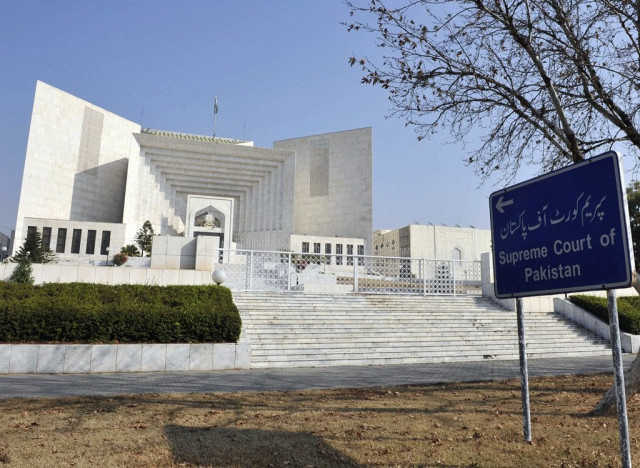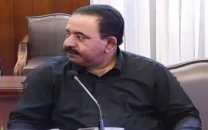Democracy cannot thrive without rule of law: SC judge
Justice Syed Mansoor Ali Shah presents ideas to improve justice system, reduce backlog of cases

The Supreme Court of Pakistan. PHOTO: AFP
Justice Shah was addressing a conference titled “Technology for Justice Forum (T4JF)”, organized by the Justice Project Pakistan with support from the Federal Republic of Germany, on Tuesday. He was defining ‘rule of law’ referred to in Article 4 of the Constitution which outlined the right of individuals to be dealt with in accordance with law.
Elaborating, he said that rule of law meant the protection of the Constitution, openness, independence of the judiciary, access to justice for all citizens, and expeditious justice. The Supreme Court judge also said he believed adjournments posed a major problem in the country’s justice system.
Justice Shah also described the technology introduced by him in the Lahore High Court to improve the justice system and how it had effectively worked to clear the backlog of cases as well as making it easy for litigants to obtain justice.
The Supreme Court judge also proposed ideas to make the judicial system more effective. Firstly, he recommended that there should be recordings of all court proceedings. He also recommended live telecasts of court proceedings, explaining that judges would then speak less during proceedings and lawyers would come fully prepared to argue cases. Justice Shah gave the example of Brazil where the judiciary had its own television and radio to telecast court proceedings.
The SC judge also proposed dictation for orders via software wherein a stenographer would not be required by a judge. Likewise, he suggested complete electronic filing to end paper / file work in courts. Justice Shah again referred to the example of Brazil where there was no paperwork and all documents were scanned and e-paper used.
He also said he believed the experiment of conducting case hearings via video link should be expanded and lawyers should be allowed to argue cases anywhere in the country through their laptops. Likewise, he explained the issue of the serving of court notices, saying that the bailiff system should be made more effective and court officials should be required to take photographs of persons who receive notices.
The SC judge also proposed an ‘analysis room’ where data on all kinds of cases should be analyzed to highlight weaknesses in the justice system.
Another SC judge, Justice Mushir Alam, also addressed the audience and revealed how he, as Chief Justice of the Sindh High Court, had utilized technology to reduce the backlog of cases in the province of Sindh.
Likewise, Federal Minister for Science and Technology Fawad Chaudhry proposed the formation of a task force comprising officials of the law ministry, judiciary and the science & technology ministry to implement the use of technology in the introduction of legal reforms.
Justice Project Pakistan’s Chief Strategy Officer Isfundiar Kasuri said on the occasion “It was an inspirational moment for those of us who have been working in isolation to integrate technology into the law, and to have Supreme Court justices, federal ministers, diplomats and private sector stakeholders aboard the first formal platform dedicated to the proliferation of technology in justice.”
Federal Minister for Finance Hammad Azhar and German Ambassador to Pakistan Bernhard Schlagheck were also present at the event. Barrister Taimur Malik also addressed the conference.



















COMMENTS
Comments are moderated and generally will be posted if they are on-topic and not abusive.
For more information, please see our Comments FAQ